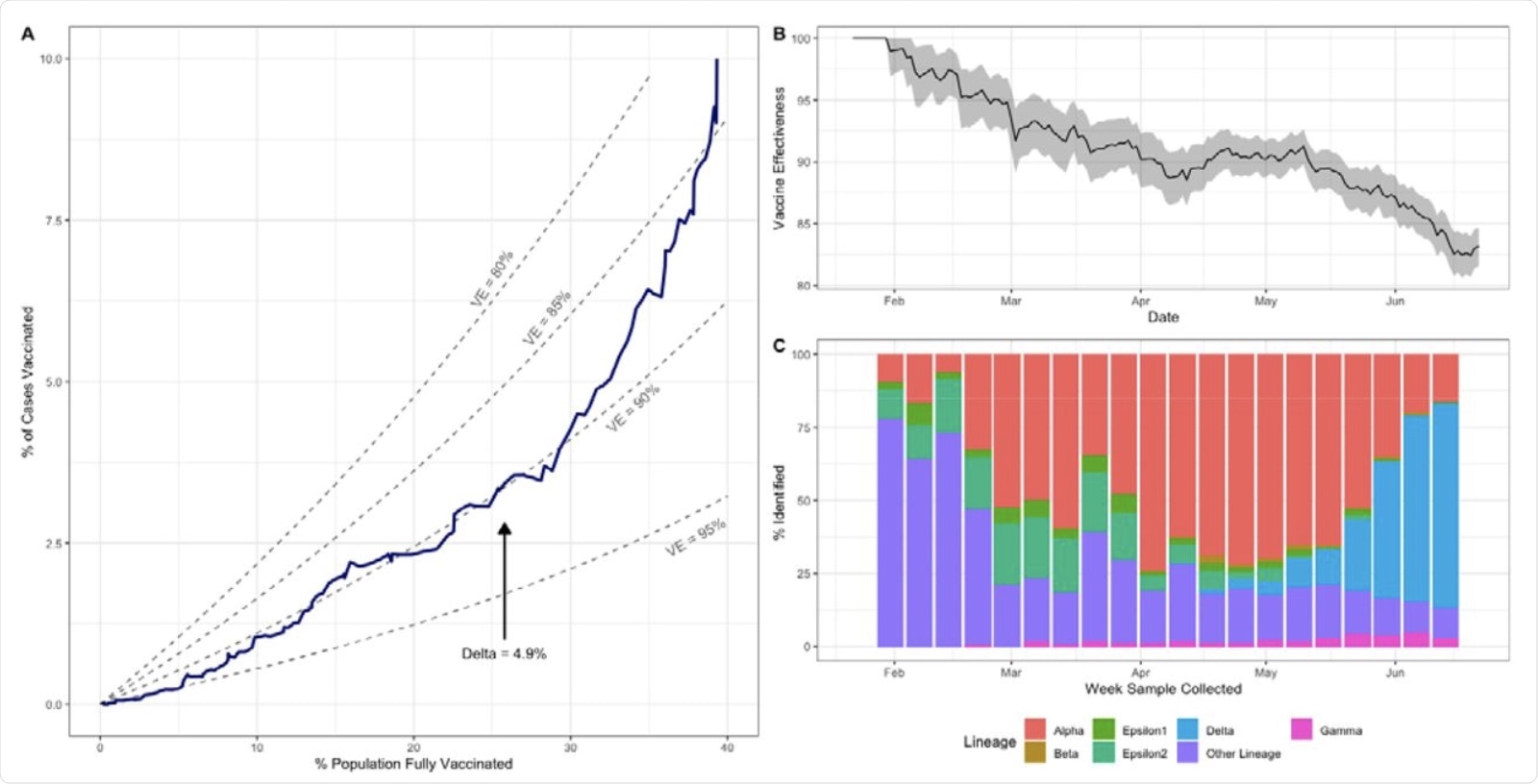Since the emergence of the severe acute respiratory syndrome coronavirus 2 (SARS-CoV-2), which is the disease responsible for the coronavirus disease 2019 (COVID-19), vaccines have been regarded as the most effective way to mitigate the spread of this virus. However, the rise of SARS-CoV-2 variants of concern (VoCs), especially the Delta variant, has increased concerns on the effectiveness of vaccines against these more transmissible VoCs.
These concerns have been exacerbated due to increased infection rates in fully vaccinated individuals as a result of the global spread of the Delta variant. In fact, a recent study published on the preprint server medRxiv* finds a reduction in vaccine effectiveness (VE) against COVID-19 in Utah corresponding to the spread of the Delta variant in the region.
 Study: Progress of the Delta variant and erosion of vaccine effectiveness, a warning from Utah. Image Credit: Lazy_Bear / Shutterstock.com
Study: Progress of the Delta variant and erosion of vaccine effectiveness, a warning from Utah. Image Credit: Lazy_Bear / Shutterstock.com

 This news article was a review of a preliminary scientific report that had not undergone peer-review at the time of publication. Since its initial publication, the scientific report has now been peer reviewed and accepted for publication in a Scientific Journal. Links to the preliminary and peer-reviewed reports are available in the Sources section at the bottom of this article. View Sources
This news article was a review of a preliminary scientific report that had not undergone peer-review at the time of publication. Since its initial publication, the scientific report has now been peer reviewed and accepted for publication in a Scientific Journal. Links to the preliminary and peer-reviewed reports are available in the Sources section at the bottom of this article. View Sources
About the study
In October 2020, the Utah Department of Health (UDOH) began monitoring SARS-CoV-2 VoCs. By mid-April 2021, the first SARS-CoV-2 Delta cases were reported by the UDOH.
In the current study, the researchers analyzed the daily vaccination numbers as well as the proportion of SARS-CoV-2 variants that were detected in infected patients. Combined daily VE, which included VE against the Delta variant and all other variants, was also included in their analysis.
Study findings
The current study found that as of June 28, 2021, 54% of the population in Utah was fully vaccinated. More specifically, 52.9% of these individuals were vaccinated with Pfizer, 38.1% with Moderna, and 9.05% with the Janssen vaccine.
 Daily percent of breakthrough cases and a population that is fully vaccinated, daily vaccine effectiveness against SARS-CoV-2, and sequencing results by week, in Utah. (A) The 14-day moving average of the percent of breakthrough cases against the percent of the population vaccinated (blue) from January 16, 2021, to June 28, 2021, with the theoretical curves for the expected percent of breakthrough cases with vaccine effectiveness ranging from 80% to 95% (grey dashed lines). (B) 14-day moving average of vaccine effectiveness against SARS-CoV-2 from January 16, 2021, to June 28, 2021, and the 95% confidence interval (shaded grey region). (C) The weekly percent of all sequenced samples by lineage from the week starting on January 17, 2021, to the week starting on June 13, 2021.
Daily percent of breakthrough cases and a population that is fully vaccinated, daily vaccine effectiveness against SARS-CoV-2, and sequencing results by week, in Utah. (A) The 14-day moving average of the percent of breakthrough cases against the percent of the population vaccinated (blue) from January 16, 2021, to June 28, 2021, with the theoretical curves for the expected percent of breakthrough cases with vaccine effectiveness ranging from 80% to 95% (grey dashed lines). (B) 14-day moving average of vaccine effectiveness against SARS-CoV-2 from January 16, 2021, to June 28, 2021, and the 95% confidence interval (shaded grey region). (C) The weekly percent of all sequenced samples by lineage from the week starting on January 17, 2021, to the week starting on June 13, 2021.
It was also observed that the number of SARS-CoV-2 cases increased by end of June to 10.5%, which was more than the expected value of 6.4%. This rise in cases was accompanied by a reduction in VE from 90% in mid-May to 83% by the end of June.
“This reduction in the effectiveness of available vaccines correlated with the arrival of novel VOCs, rather than waning immunity, is highly concerning.”
This increase in cases and decrease in VE should be of concern, as it indicates that the Delta variant has the potential to cause COVID-19 outbreaks, even in highly vaccinated populations.
“If there is a consistent trend of increasing immune escape as new variants arise, it could eventually undermine the effectiveness of current vaccines and necessitate mass re-vaccination.”

 This news article was a review of a preliminary scientific report that had not undergone peer-review at the time of publication. Since its initial publication, the scientific report has now been peer reviewed and accepted for publication in a Scientific Journal. Links to the preliminary and peer-reviewed reports are available in the Sources section at the bottom of this article. View Sources
This news article was a review of a preliminary scientific report that had not undergone peer-review at the time of publication. Since its initial publication, the scientific report has now been peer reviewed and accepted for publication in a Scientific Journal. Links to the preliminary and peer-reviewed reports are available in the Sources section at the bottom of this article. View Sources